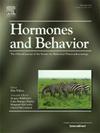催产素在多个时间尺度上影响雄性三刺鱼的亲代照料
IF 2.4
3区 医学
Q2 BEHAVIORAL SCIENCES
引用次数: 0
摘要
众所周知,催产素(OXT)及其同源物可以调节脊椎动物的亲职护理,但这些神经肽在亲职护理的进化过程中可能扮演何种角色尚不清楚。在这里,我们比较了三刺鱼(Gasterosteus aculeatus)两种最近出现分化的生态型,它们在亲代照料方面存在差异。普通生态型的雄性为其后代提供强制性单亲照顾,而白色生态型的雄性则在受精后遗弃其后代。为了测试 OXT 是否在丧失照顾中发挥作用,我们通过腹腔注射车辆对照、OXT 单剂量或双剂量或 OXT 拮抗剂来操纵两种生态型雄性的 OXT。我们在两个时间点(受精后 0 天和 4 天 (dpf))和一个时间点(受精后 0 天 dpf)观察了公鱼和白鱼对注射的行为反应。我们的结果表明,在共生体中,OXT 能促进照料的开始,但不能促进照料的维持。值得注意的是,最终终止产卵的共生体在0 dpf时对OXT没有反应,这可能是它们未能过渡到照料状态的原因。白鲑对OXT操作的反应与普通鲑不同,这表明白鲑失去照料并不是因为对OXT失去敏感性或OXT配体水平不足,而是OXT作用的潜在亲本回路发生了进化变化。这些结果提供了证据,证明像 OXT 这样古老的激素系统可以在多个时间尺度上导致照料的丧失本文章由计算机程序翻译,如有差异,请以英文原文为准。
Oxytocin influences parental care in male threespine stickleback across multiple time scales
Oxytocin (OXT) and its homologs are known to regulate parental care in vertebrates, but it is unknown what role these neuropeptides may play in the evolutionary loss of care. Here, we compared two recently diverged ecotypes of threespine stickleback (Gasterosteus aculeatus) that differ in parental care. Males of the common ecotype provide obligate, uniparental care to their offspring, whereas males of the white ecotype abandon their offspring after fertilization. To test if OXT plays a role in the loss of care, we manipulated OXT in males of both ecotypes via intraperitoneal injection of a vehicle control, OXT single- or double-dose, or an OXT antagonist. We observed the behavioral response to injection at two time points for commons (0 and 4 days post-fertilization (dpf)) and one for whites (0 dpf). Our results suggest that, in commons, OXT promotes the onset of care but not its maintenance. Notably, commons that ultimately terminated their clutches did not respond to OXT at 0 dpf, which may have contributed to their failure to transition to a state of care. Whites responded to OXT manipulation in a different manner than commons, suggesting that the loss of care in whites is not due to a loss of sensitivity to OXT, or insufficient levels of OXT ligand, but rather an evolutionary change to the underlying parental circuit that OXT is acting on. These results provide evidence that ancient hormonal systems like OXT can contribute to losses of care over multiple timescales
求助全文
通过发布文献求助,成功后即可免费获取论文全文。
去求助
来源期刊

Hormones and Behavior
医学-行为科学
CiteScore
6.70
自引率
8.60%
发文量
139
审稿时长
91 days
期刊介绍:
Hormones and Behavior publishes original research articles, reviews and special issues concerning hormone-brain-behavior relationships, broadly defined. The journal''s scope ranges from laboratory and field studies concerning neuroendocrine as well as endocrine mechanisms controlling the development or adult expression of behavior to studies concerning the environmental control and evolutionary significance of hormone-behavior relationships. The journal welcomes studies conducted on species ranging from invertebrates to mammals, including humans.
 求助内容:
求助内容: 应助结果提醒方式:
应助结果提醒方式:


